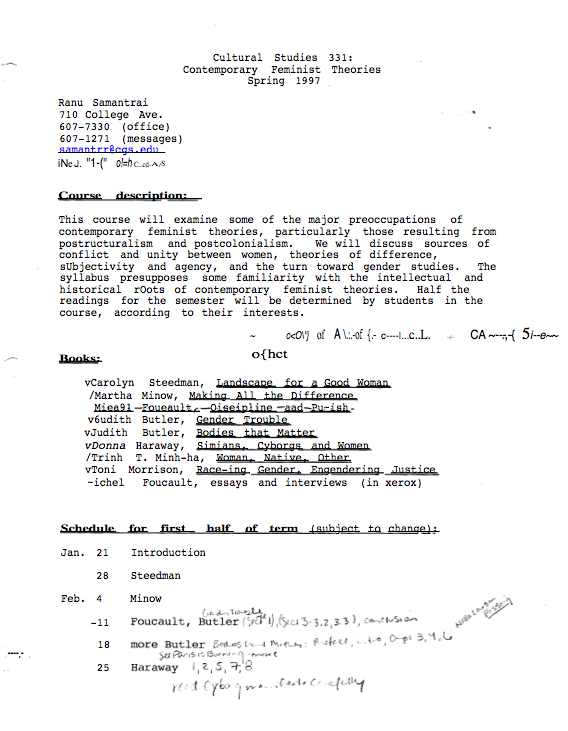Since it felt too overwhelming to try and write an account about Judith Butler and how her work, especially in Gender Trouble, has influenced my intellectual history, I decided to post a handful of my documents that focus on her work, along with a brief account instead. Reading through old papers and remembering the various presentations and lectures that I’ve given about Butler, does give me pause and makes me wonder, Why so much attention on one scholar?
Documents:
- Class Paper, Spring 1998
- Directed Reading, Spring 2002
- Class Presentation, Spring 2002
- Class Presentation, Spring 2002
- NWSA Presentation, 2004
- NWSA Presentation, 2007
- Course Syllabus, 2009
- Course Syllabus, 2011
- Blog Posts, 2009-present
Recently, I decided to look through my old notes to find evidence of my first encounter with the theorist, philosopher, troublemaking role model, Judith Butler. In my video introduction to my Trouble blog, I claimed that this first encounter occurred in the fall of 1996, my first year in graduate school. But I discovered that I actually encountered Butler and Gender Trouble in February of 1997, in my Contemporary Feminist Theory course at Claremont Graduate School. According to the syllabus, I first started reading Gender Trouble on February 11th:
It’s interesting to read through my old copy of Gender Trouble (the 1990 version) and see that my favorite line, the one that has inspired much of my work on the ethics of troublemaking and troublestaying (“trouble is inevitable and the task, how best to make it, what best way to be in it.”) is not underlined.
On that day in 1997, I was interested more in Butler’s challenge to the subject/identity “woman” and her critique of feminist identity politics. I had devoted a lot of attention to the question of “woman” in my senior thesis, written just two years prior in 1995, and Butler was addressing many of the same issues (like essentialism vs. social construction) in a way that was new for me. Did I ever come across her name while working on my senior thesis? And, having recently been exposed to deconstruction and postmodern critiques of the self, I liked her idea of politics as parody, her rethinking of agency through Nietzsche and her discussions of Luce Irigaray.
Since meeting Butler in 1997, I’ve devoted a lot of time to thinking through her words and ideas in Gender Trouble. Several grad school papers, in-class presentations and my master’s thesis and doctoral dissertation are (at least partly) about her work in Gender Trouble and beyond. And so are three of my presentations at the National Women’s Studies Association Conference: 1. Butler and risking identity (2001), Butler’s radical democracy (2004) and Butler and the virtue of troublemaking (2007). I’ve assigned her texts for my courses, devoting individual sessions to some of her ideas and also shaping entire classes around her importance for queer theory and her ethical evolution. And, I wrote an experimental essay in which I put my experiences of engaging with her texts on grief and the livable life beside my experiences of living and grieving beside my dying mom and my young daughter.
Why have I spent so much time on Judith Butler? I’m not totally sure, but I think it’s partly because meeting Butler through Gender Trouble, and then reading her subsequent works on gender, deconstruction, speech act theory, radical democracy, feminism, queer theory, grief, critique and more, offered me a useful entry point into some very important theoretical discussions of the late 20th/early 21st century. She’s not the only (or the best?) theorist to discuss these issues, but something about the way that she framed it, in relation to trouble and feminism, mattered to me. I suppose I’ve kept reading, studying and writing about her work in order to make sense of why it mattered to me and how I could respond to it.
I think I’ve also spent a lot of time with her work because I like the challenge of crafting an ethical project around making and being in trouble. As I’ve witnessed over the years, the concept that making trouble, especially Butler’s articulation of it, could be ethical is met with a lot of resistance by others. I like resistance. Even as I feel drained and sometimes overwhelmed by the negative reactions (dismissive nods; knowing smirks exchanged at conference presentations; outright hostility and rejection), I relish working on projects that are overlooked by or unimaginable to others.
In thinking about the resistance to my project, I want to conclude this brief account (I could probably write an entire book on my engagements with Butler’s theories), with a memory from grad school. I originally posted this memory on a blog post, way back in September 2009.
For too long, the popular (among academics, that is) understanding of Gender Trouble is that is was not only counter but harmful to ethics/ethical projects. I remember this happening a lot in grad school. Ah, grad school…On the first day of every semester you had to go around the room and give your little spiel about what your academic interests were. Although I tried to mix it up, I usually ended up saying something about the ethical possibilities in the work of Judith Butler. One time, after describing my academic interests, the professor sarcastically uttered, “good luck with that.”
Thinking about the ethical possibilities of Butler’s work for the past several years, especially in relation to troublemaking and troublestaying, has been incredibly useful and (mostly) enjoyable for me. While I haven’t written an academic book or become the Expert on Butler, my critical engagements with her ideas, through deep reading, class discussions and writing/creative projects, has generated some valuable work that has helped me to make sense of my experiences and their relation to the larger world.

